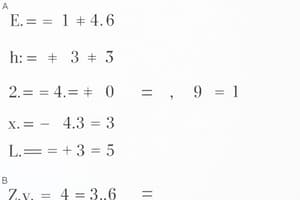Podcast
Questions and Answers
¿Cuál es el resultado de expandir $(x+5)(x+2)$ utilizando la propiedad FOIL?
¿Cuál es el resultado de expandir $(x+5)(x+2)$ utilizando la propiedad FOIL?
¿Qué es el resultado de factorizar $y^2 - 4y + 4$?
¿Qué es el resultado de factorizar $y^2 - 4y + 4$?
Si $z = 2$, ¿cuál es el resultado de evaluar $3z - 5$?
Si $z = 2$, ¿cuál es el resultado de evaluar $3z - 5$?
¿Cómo se simplifica la expresión $4x^2 + 2x - x^2$?
¿Cómo se simplifica la expresión $4x^2 + 2x - x^2$?
Signup and view all the answers
¿Cuál es el resultado de expandir $(2y+3)(y+4)$ utilizando la propiedad FOIL?
¿Cuál es el resultado de expandir $(2y+3)(y+4)$ utilizando la propiedad FOIL?
Signup and view all the answers
¿Qué operación matemática en las expresiones algebraicas implica reducir la expresión a su forma más básica al combinar términos similares, eliminar exponentes o cancelar fracciones?
¿Qué operación matemática en las expresiones algebraicas implica reducir la expresión a su forma más básica al combinar términos similares, eliminar exponentes o cancelar fracciones?
Signup and view all the answers
¿Cómo se pueden combinar términos semejantes en una expresión algebraica?
¿Cómo se pueden combinar términos semejantes en una expresión algebraica?
Signup and view all the answers
¿Cuál es la operación matemática que consiste en desglosar las expresiones a su forma original, en opposition a simplificarlas?
¿Cuál es la operación matemática que consiste en desglosar las expresiones a su forma original, en opposition a simplificarlas?
Signup and view all the answers
En la expresión 3x^2 - 2x + 5x^2 - 4, ¿cuál sería el resultado al combinar los términos semejantes?
En la expresión 3x^2 - 2x + 5x^2 - 4, ¿cuál sería el resultado al combinar los términos semejantes?
Signup and view all the answers
¿Cuál de las siguientes no es una operación común al trabajar con expresiones algebraicas?
¿Cuál de las siguientes no es una operación común al trabajar con expresiones algebraicas?
Signup and view all the answers
Study Notes
Algebraic Expressions and Operations on Them
Algebraic expressions involve variables, constants, and mathematical operations performed on those elements. They can take a variety of forms, including basic arithmetic expressions, polynomials, and even more complex equations. When dealing with algebraic expressions, there are several common operations you'll encounter: simplifying expressions, combining like terms, expanding expressions, factoring expressions, and evaluating expressions.
Simplifying Expressions
Simplification reduces an expression to its most basic form by performing certain operations such as combining like terms, eliminating exponents, or canceling out fractions. For example, reducing the polynomial x^2 + x - 4 to its simplest form involves removing the negative sign from the last term, resulting in (x+2)^2. This process is often used to make calculations easier.
Combining Like Terms
Like terms refer to terms that have the same variable raised to the same power. In expressions like x^2 + x^2, we can combine the like terms into one term by adding their coefficients, resulting in 2x^2. Similarly, in 3x + 2x = 5x, the sum of the coefficients becomes the coefficient of the combined term. This operation allows us to eliminate unnecessary redundancy in our algebraic expressions.
Expanding Expressions
Expansion is the opposite of simplification; it involves breaking down expressions to their original form. One common method of expansion involves multiplying binomials using the FOIL (First, Outer, Inside, Last) property. For example, expanding (x+3)(x+4) gives x^2 + 7x + 12. This process can help in solving more complicated problems, as it provides a step-by-step breakdown of complex expressions.
Factoring Expressions
Factoring involves breaking down an expression into simpler parts called factors. For example, factoring x^2 + x + 1 gives us (x+1)(x+1), which can then be further simplified by canceling out the common factor of (x+1). This process helps to find roots and solve equations more easily. Factoring can sometimes be done with algebraic manipulation or through the use of known factoring techniques such as the difference of squares method, the perfect square trinomial method, or dividing a quadratic by another polynomial.
Evaluating Expressions
Evaluation involves substituting values for variables in an expression and performing calculations to determine the result. For example, evaluating the expression 2x + 3 when x = 5 gives us 5, since we substitute all occurrences of x with its given value of 5 and then add the constant 3 to get our final answer. This process allows us to find specific numerical values for expressions.
In summary, understanding algebraic expressions and their operations involves familiarity with concepts like simplifying expressions, combining like terms, expanding expressions, factoring expressions, and evaluating expressions. These skills are essential for solving various algebra problems and understanding the structure of different mathematical models.
Studying That Suits You
Use AI to generate personalized quizzes and flashcards to suit your learning preferences.
Description
Aprende sobre operaciones comunes realizadas en expresiones algebraicas, como simplificación, combinación de términos semejantes, expansión y factorización. Estas operaciones son fundamentales para resolver problemas algebraicos y comprender la estructura de diferentes modelos matemáticos.




